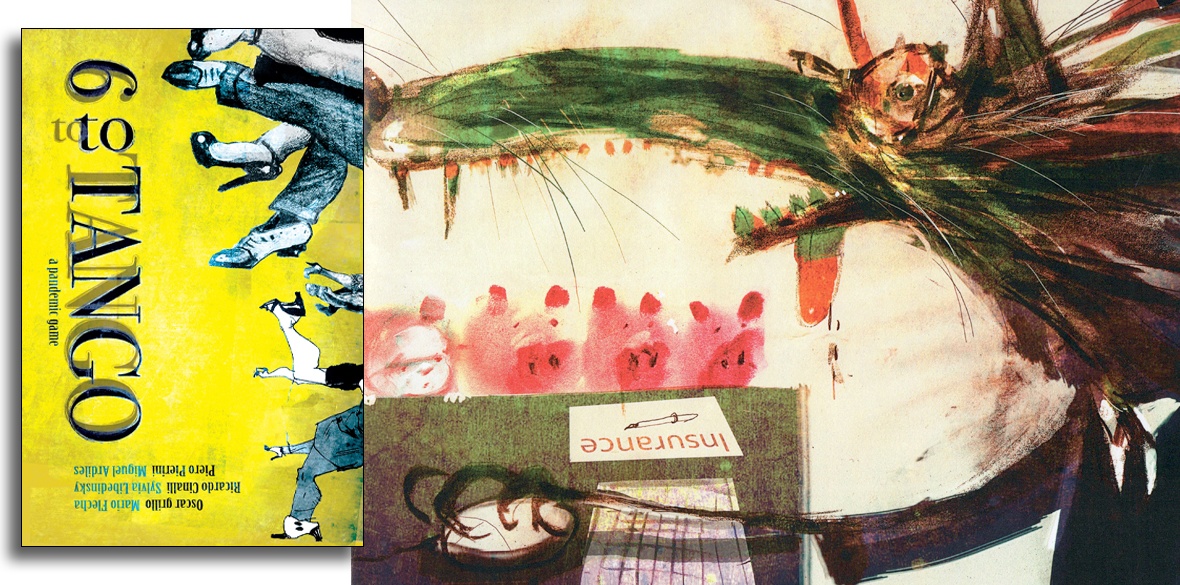This is the last article you can read this month
You can read more article this month
You can read more articles this month
Sorry your limit is up for this month
Reset on:
Please help support the Morning Star by subscribing here
TANGO has defined the culture and people of Argentina for generations. From its humble beginnings in the late 19th century in the brothels of poor neighbourhoods of Buenos Aires.
Later its fusions with flamenco, milonga and Cuban habanera that gave way to salon tango, to the creations of Astor Piazzola and Gotan Projects, tango has become not only a way of life, but a passion and an excuse to bring people together.
6 To Tango (Viperfish, £15) is born from the very seed that has characterised tango, one that allowed collaborations, dialogues and friendship between artists.
The book consists of three collaborations. Illustrator Piero Pierino responds to the poems of Miguel Ardiles while Ricardo Cinalli illustrates a story by Sylvia Libedisnky, and lastly Oscar Grillo illustrates Mario Flecha’s stories.
This fascinating book offers memorable, passionate, sometimes absurd and funny stories, all full of life’s rhythm. It begins with the tragic story of three dwarfs, their passionate and sometimes bloody love affair, which is masterfully illustrated by Cinalli.
Pierini’s exquisite work (reviewed in the Star August 15 2018 — https://mstar.link/purgatoryvisions), noted for the expressive brushwork, for his colourful and dark collages, interprets intriguingly each of Ardiles’s beautiful short poems.
Grillo reflects Flecha’s short stories’ comic and often ironic aspects. All in all it is a delightful book of Argentinean collaborations borne out as much of friendships in exile as their shared way of perceiving and narrating the world: as dramatic as tango.
“This book is a colourful, and highly entertaining proof of the passionate friendship between six Argentinean living in London,” writes in the foreword Juan Toledo.
Harutu Woman (Victorina Press, £10) is Mexican writer and poet Paloma Zozaya Gorostiza’s debut novel. The book’s title, meaning “white woman,” tells the personal journey of a Guatemalan teacher called Selene who arrives in a Mexican town on the Atlantic coast where her life will be transformed forever.
There she meets a local man, with whom she would end up forming a family and subsequently getting closely involved with many aspects of the local community.
I was struck by Zozaya Gorostiza’s straight-forward prose, her in-depth description of clashes of cultures, morals, class and life experiences between Selene and the people of the town of Redencion (Redemption).
It is a powerful book the delves deep into the historical land conflicts in that region, the pervasive drug trafficking and narco-violence as well as the conflict between the local population and the rich landowners only interested in cash crops.
There are healers, peasants, drug dealers, warrior dancers and all sorts of extraordinary characters mingle in this wonderful debut novel by a strong voice from Mexico in the diaspora — impressively translated from the Spanish by writer and poet Juan Julian Caicedo.
Havana Year Zero (Charco Press, £9,99), by Cuban Karla Suarez, has also at its core the experiences of a female character, Julia, in early 1990s Havana in the midst of an economic crisis that began with the fall of the Soviet Union.
The story, gracefully translated by Christina MacSweeney, revolves around Julia, a young woman who teaches maths in a school somewhere in the city. She is on a personal quest to find an almost mythical document that will prove that the telephone was not invented by the Anglo-American Alexander Graham Bell in the US, but rather in Havana by an obscure Italian scientist called Antonio Meucci, an associate of Giuseppe Garibaldi.
The search will lead Julia to three men Euclid, an elder mathematician with whom she once had an affair, Angel, her current love interest with a wife who left him to live in Brazil, and a writer Leonardo, who is writing a novel about Meucci.
“It all happened in 1993, Year Zero in Cuba. The year of interminable power cuts, when bicycles filled the streets of Havana and the shops were empty. There was nothing of anything. Zero transport. Zero meat. Zero hope. I was 30 and I had thousands of problems,” so begins this masterfully crafted novel by one of the clearest and most stimulating voices in Cuba’s literature.










